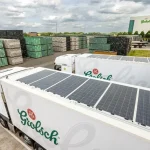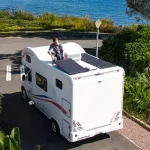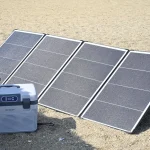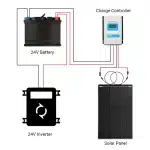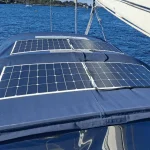Best Off-grid solar systems are a growing trend for generating electricity in cabins, boats, RVs, and campgrounds. Just as residential solar systems are becoming more common, so are off-grid solar systems. The difference between a typical residential solar system and an off-grid version is simply a matter of size and connectivity.
Off-grid solar systems use the sun’s energy to power homes, off-grid buildings, and recreational vehicles. Unlike a grid-tied solar system, batteries store any solar energy collected from the panels in order to power part or all of the home.
What is an Overview of Off-Grid Solar Energy Systems
Off-grid solar systems are self-contained and provide power directly to buildings and homes using solar panels, batteries, and other equipment. They are great for those who want to maximize the potential of solar power. A good off-grid solar system will include everything needed to generate, distribute, and store solar power. They can also operate without a connection to the utility grid, so they can be used in remote areas. Most people use off-grid solar power to generate electricity in their cabins, to power appliances in their RVs, to power a small, energy-efficient home, and to charge their mobile phones or tablets. The size and power of your off-grid solar system will determine how much power you have available.
Advantages:
Lower Carbon
Emissions
Lower Power
Bills
Independence
This section reviews the top off-grid solar panel suppliers in the world, examining the strengths and weaknesses of their products, the companies themselves, and their systems.
How We Selected the Best Off-Grid Solar Companies
Our ratings consider customer reviews, support options, pricing, national availability, installation options, and product features. All ratings are at our editorial team’s discretion.
Why you can trust Sungold
Why you can trust House of Sungold: The House of Sungold team is dedicated to providing you with impartial, unbiased ratings and information. We rely on data and expert opinions to guide our decisions. We have been involved in manufacturing and off-grid system design solutions for 16 years and have a collection of nearly 50 customer case studies, mostly from Europe and North America, to ensure their accuracy and relevance.
key Takeaways
Our pick for the best off-grid solar system is Sungold, followed closely by ACOPOWER, Renogy, WindyNation, and more.
Off-grid solar systems can cost anywhere from a few hundred dollars for a basic setup to tens of thousands of dollars to power an entire house, depending on your energy needs.
Despite the universal benefits of solar energy, off-grid systems really shine in remote areas, avoiding blackouts, reducing energy bills and lowering your carbon footprint.
How We Selected the Best Off-Grid Solar Companies
Sungold
Why We Chose Sungold
Sungold is a top manufacturer of off-grid solar panels, known for their lightweight designs. They offer a range of products, from small to large ODM design kits, with a variety of options. After 16 years in business and over 500+ custom off-grid system design products sold, the company now offers solutions for caravans, yachts, livestock, and stationary small-scale solar energy needs. They offer a variety of lightweight and portable products, and are the only company to offer products that can be customized to fit your off-grid system in a range of voltages and sizes to suit your needs, making them versatile in a range of scenarios.
Why We Choose Sungold
Sungold is a top manufacturer of off-grid solar panels, known for their lightweight designs. They offer a range of products, from small to large ODM design kits, with a variety of options. After 16 years in business and over 500+ custom off-grid system design products sold, the company now offers solutions for caravans, yachts, livestock, and stationary small-scale solar energy needs. They offer a variety of lightweight and portable products, and are the only company to offer products that can be customized to fit your off-grid system in a range of voltages and sizes to suit your needs, making them versatile in a range of scenarios.
Pros and Cons.
Pros:
Customisable, custom voltage, different sizes
Off-Grid Solar Professional Manufacturer
Excellent value for money
Rich Product Selection
Extensive warranty for long-term reliability
Cons:
Installation instructions are not very detailed
Low-cost kit option not available
Mixed wind energy not available
What sets Sungold apart?
Sungold’s advantage lies in its lightweight and semi-flexible panels. Its products are made for those who want solar energy that is versatile and portable, but still strong and effective. It is known for its off-grid and grid-tied solutions, which can power a small home or cabin completely!
Available Systems
Sungold offers the following kits:
100 Watt Starter Kit with a solar panel and a 10A charger
2.2KW 8-panel 270w flex panel + 2.5KW inverter + 30A PWM + 5760wh energy storage
200w
Renogy
Why We Picked It
Renogy is well-known for its wide range of solar products for beginners and seasoned off-grid enthusiasts alike. Their comprehensive DIY kits make it easy for a wider audience to get into solar power.
Pros and Cons.
Pros:
Wide selection of solar kits and modules.
Powerful Educational Resources for DIY Installers
Battery included in larger kit
Cons:
Some products may lack advanced features found in higher-end models.
More expensive than some competitors
Customer service can be difficult to reach
What Sets Renogy Apart
Renogy has a broad selection of kits and custom options for off-grid solar customers. Whether you’re new to solar, planning to expand, or a solar veteran, Renogy has something for you.
Available Systems
Renogy offers a variety of solar systems and products, including the following kits:
– 100 watt starter kit with one solar panel and a 10A PWM charger for $129.99.
– 2.5 kW Advanced Plus Kit system with eight high-efficiency panels, two lithium batteries and an all-in-one powerbox for easy component installation.
Acopower
Why We Picked It
AcoPower is known for their portable solar solutions and solar coolers, perfect for outdoor enthusiasts and off-grid living. They specialize in portable and efficient energy solutions to meet the growing demand for sustainable outdoor and travel options.
A relative newcomer to the DIY solar industry, AcoPower is an emerging leader. The company provides small-scale solar solutions for RVs and stationary power generation, offering a wide range of products including low-cost starter kits.AcoPower also offers larger solar DIY kits and a long list of additional related hardware.
Pros and Cons.
Pros:
Innovative Portable Solar Products
User-friendly design, great for camping and outdoor use
Excellent customer service
Cons:
Smaller operations may affect product usability
Solar kits are expensive
Portable products are mainly dependent on imports
What Sets Acopower Apart
A specialist in solar power for RVs, Acopower also makes portable power systems for stationary off-grid use. They offer a variety of systems and even solar-powered refrigeration.
Available Systems
Their smallest and largest solar kits include a 100-watt system with a single panel and 20A PWM charge controller priced at $188.99, and an 800-watt system with four panels, a 60A MPPT controller and mounting hardware priced at $1,349.00.
Eco-Worthy
Why We Picked It
Eco-Worthy is the best choice if you want a high-quality solar power system that doesn’t cost a lot. They have been in business for 15 years and have sold over 500,000 solar systems. They have good ratings and lots of different kits to choose from. This ECO-WORTHY model is a good one to start with if you have never installed solar panels before. It is easy to install because it has holes already drilled in it.
Pros and Cons.
Pros:
Affordable prices covering a wide range of products.
Good performance-to-cost ratio.
Responsive customer support.
Cons:
Some products may not be able to match the durability of more expensive alternatives.
For professional off-grid systems that cannot
What Makes Eco-Worthy Different
Eco-Worthy has a long list of off-grid solar products and kits available,
ranging from 100 watts to 5 kilowatts, so you can find almost any size and
type of off-grid system for your small home, cabin or RV. One of its entrylevel
kits even includes a flexible solar panel for added installation
options.
Systems Available: Available Systems
Eco-Worthy has a large selection of off-grid solar kits. The entry level is a 130-watt system with a flexible solar panel and battery charger that retails for $188.22. The top-of-the-line setup includes 24 solar panels, four batteries and an inverter charger and retails for $12,874.99. Eco-Worthy also has hybrid wind and solar kits.
Alte
Why We Picked It
Alte is a pioneer in the solar industry, offering custom solar panel systems and a wealth of knowledge through their educational resources. Their commitment to providing consumers with the information and tools they need to make informed decisions about solar energy is unparalleled.AltE offers larger scale off-grid solar solutions for stationary environments. Most of these systems are not designed for RV or portable use. However, some of the smaller systems can certainly be adapted to this lifestyle. Instead, they are primarily used as complete or backup systems for smaller homes and cabins.
Pros and Cons.
Pros:
Customised system design services
High-quality product line-up.
Excellent customer service
Cons:
Customised solutions can be more expensive than standard kits
Portable off-grid systems
What Makes Alte Different
Alte is dedicated to client education and tailor-made solutions that give a customized approach to solar energy, catering to those seeking a custom system to meet their unique energy needs.
Available Systems
AltE provides a variety of systems for small houses, cabins, and off-grid homes. The most affordable system is the 200-watt system at $1,783.17. It comes with one panel, a lithium battery, pure sine wave inverter, and 45A charger. The most expensive system is the $16,581.69 10 panel system for complete off-grid living.
The Benefits of an Off-Grid Solar System
Choosing an off-grid solar system is an important step toward
sustainability and self-sufficiency. Here are some of the key benefits:
Energy Independence
Off-grid solar systems offer the ultimate in energy independence. By generating your own electricity, you not only reduce your utility bills; you also reduce your dependence on the grid. This independence ensures a reliable supply of electricity, especially in areas prone to power outages or limited grid access. Homeowners and businesses can rest easy knowing they are in control of their energy.
Freedom to Boondock
For RVers and outdoor enthusiasts, off-grid solar systems open up a world of freedom. Boondocking or dry camping without a connection is made easier with a reliable solar setup. This allows for exploring more remote areas without having to worry about power availability. Off-grid systems support sustainable traveling with the comforts of home wherever you are.
Lower Carbon Emissions
Switching to an off-grid solar system can significantly reduce carbon emissions. Solar energy is a clean, renewable resource that does not contribute to air pollution or greenhouse gases. By going solar, you are contributing to the fight against climate change and creating a healthier planet for future generations.
Going solar also helps to reduce carbon emissions. Solar energy is a clean, renewable resource that does not contribute to air pollution or greenhouse gases. By going solar, you are helping to reduce your carbon footprint and create a healthier planet for future generations.
FAQ
What are the disadvantages of off-grid solar systems?
Off-grid solar systems offer incredible independence and environmental benefits, but they also come with their own set of challenges. One major drawback is the upfront cost, which can be
significantly higher due to the need for extensive battery storage and a more robust panel setup to ensure reliability. Weather variability can also impact energy production, so systems must be oversized to compensate for less sunny days, increasing the investment. Maintenance and the technical know-how required to manage these systems can pose additional hurdles. Despite these challenges, with proper planning and investment, the long-term benefits often outweigh the drawbacks for many users.
What is the difference between an off-grid solar system and a grid-tied solar system?
The fundamental difference between off-grid and grid-tied solar systems lies in their connection (or lack thereof) to the municipal electricity grid. Off-grid systems are entirely self-sufficient, relying on batteries to store excess power generated during the day for use at night or during low sunlight periods. In contrast, grid-tied systems are connected to the public electricity grid, allowing for the exchange of surplus energy for credits and the use of grid power when solar production is insufficient. While off-grid systems offer independence and are essential in remote areas without grid access, grid-tied systems benefit from the backup and potential financial incentives offered by the grid. The main difference between solar energy systems that are off-grid
and those that are grid-tied is whether or not the system is connected to the local utility grid. Off-grid systems are self-sufficient, using batteries to store excess electricity generated during the day for use at night or during periods of low sunlight. Grid-tied systems are connected to the utility grid, allowing homeowners to receive credits for excess electricity they produce and to use electricity from the grid when their solar panels aren’t producing enough power. While off-grid systems are a necessity for homeowners in remote areas that aren’t connected to the grid, grid-tied systems offer the benefit of backup power and potential financial incentives.
How do I build an off-grid solar system?
Building your off-grid solar system entails several essential steps.
First, assess your energy requirements and evaluate your site. Determine how much energy you use daily. Then, choose the correct number and size of solar panels, the right inverter, and the appropriate battery bank capacity. Use high-quality, long-lasting components that match your energy needs. You may need to hire a professional to install your system, especially to ensure safe electrical connections and proper panel placement. Regularly maintain and monitor your system to keep it running smoothly and to address any problems.


